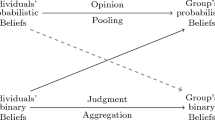Abstract
In the paper we argue that aggregation rules in the theory of belief functions should be in accordance with underlying decision models, i.e. aggregation produced in conjunctive manner has to produce the order embedded to the union of partial orders constructed in each source of information; and if we take models based on imprecise probabilities, then such aggregation exists if the intersection of underlying credal sets is not empty. In the opposite case there is contradiction in information and the justifiable functional to measure it is the functional giving the smallest contradiction by applying all possible conjunctive rules. We give also the axiomatics of this contradiction measure.
Access this chapter
Tax calculation will be finalised at checkout
Purchases are for personal use only
Similar content being viewed by others
References
Augustin, A., Coolen, F.P.A., de Cooman, G., Troffaes, M.C.M. (eds.): Introduction to Imprecise Probabilities. Wiley, New York (2014)
Bronevich, A.G., Rozenberg, I.N.: The choice of generalized Dempster-Shafer rules for aggregating belief functions. Int. J. Approx. Reason. 56, 122–136 (2015)
Cattaneo, M.E.G.V.: Combining belief functions issued from dependent sources. In: Proceedings in Informatics, ISIPTA 2003, vol. 18, pp. 133–147. Carleton Scientific, Waterloo (2003)
Dempster, A.P.: Upper and lower probabilities induced by a multivalued mapping. Ann. Math. Stat. 38, 325–339 (1967)
Destercke, S., Burger, T.: Toward an axiomatic definition of conflict between belief functions. IEEE Trans. Syst. Man Cybern. 43, 585–596 (2013)
Dubois, D., Prade, H.: A set-theoretic view of belief functions: logical operations and approximations by fuzzy sets. Int. J. Gen. Syst. 12, 193–226 (1986)
Dubois, D., Prade, H.: On the combination of evidence in various mathematical frameworks. In: Flamm, J., Luisi, T. (eds.) Reliability Data Collection and Analysis. Reliability and Risk Analysis, pp. 213–241. Springer, Dordrecht (1992)
Dubois, D., Yager, R.: Fuzzy set connectives as combination of belief structures. Inf. Sci. 66, 245–275 (1992)
Shafer, G.: A Mathematical Theory of Evidence. Princeton University Press, Princeton (1976)
Yager, R.: On the Dempster-Shafer framework and new combination rules. Inf. Sci. 41, 93–137 (1987)
Author information
Authors and Affiliations
Corresponding author
Editor information
Editors and Affiliations
Rights and permissions
Copyright information
© 2016 Springer International Publishing Switzerland
About this paper
Cite this paper
Bronevich, A.G., Rozenberg, I.N. (2016). Conjunctive Rules in the Theory of Belief Functions and Their Justification Through Decisions Models. In: Vejnarová, J., Kratochvíl, V. (eds) Belief Functions: Theory and Applications. BELIEF 2016. Lecture Notes in Computer Science(), vol 9861. Springer, Cham. https://doi.org/10.1007/978-3-319-45559-4_14
Download citation
DOI: https://doi.org/10.1007/978-3-319-45559-4_14
Published:
Publisher Name: Springer, Cham
Print ISBN: 978-3-319-45558-7
Online ISBN: 978-3-319-45559-4
eBook Packages: Computer ScienceComputer Science (R0)




